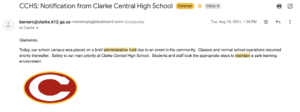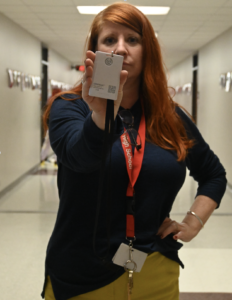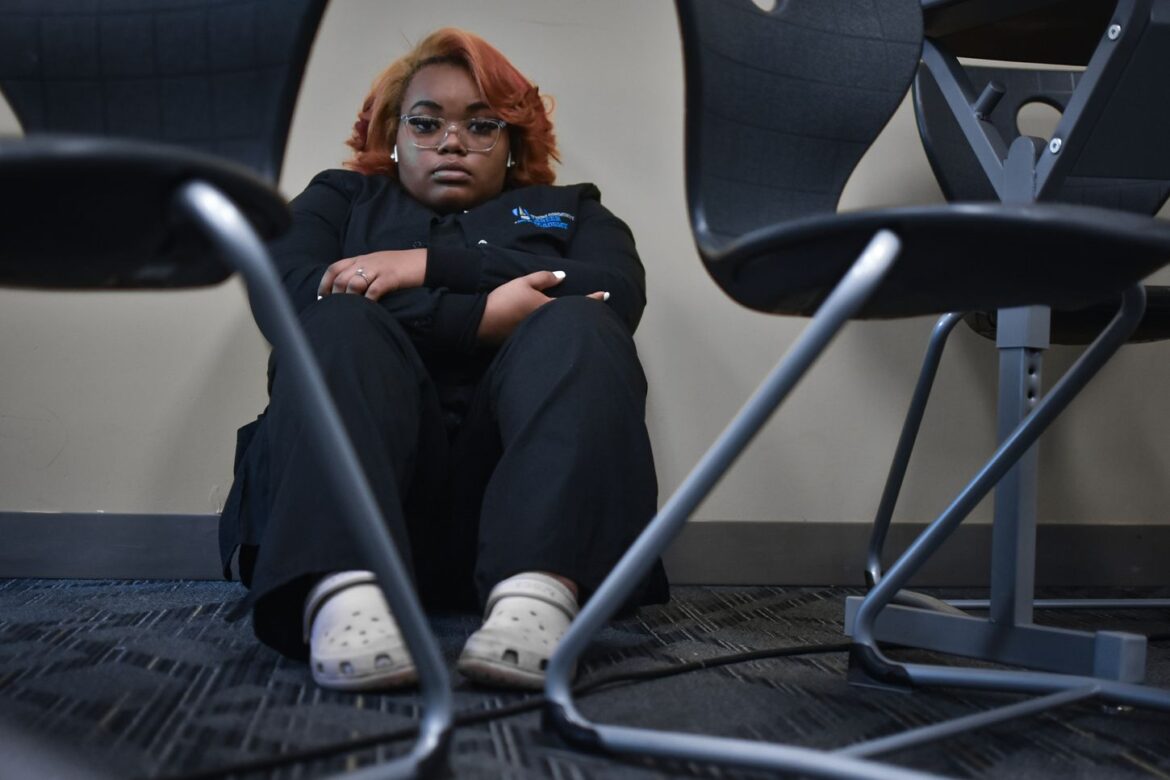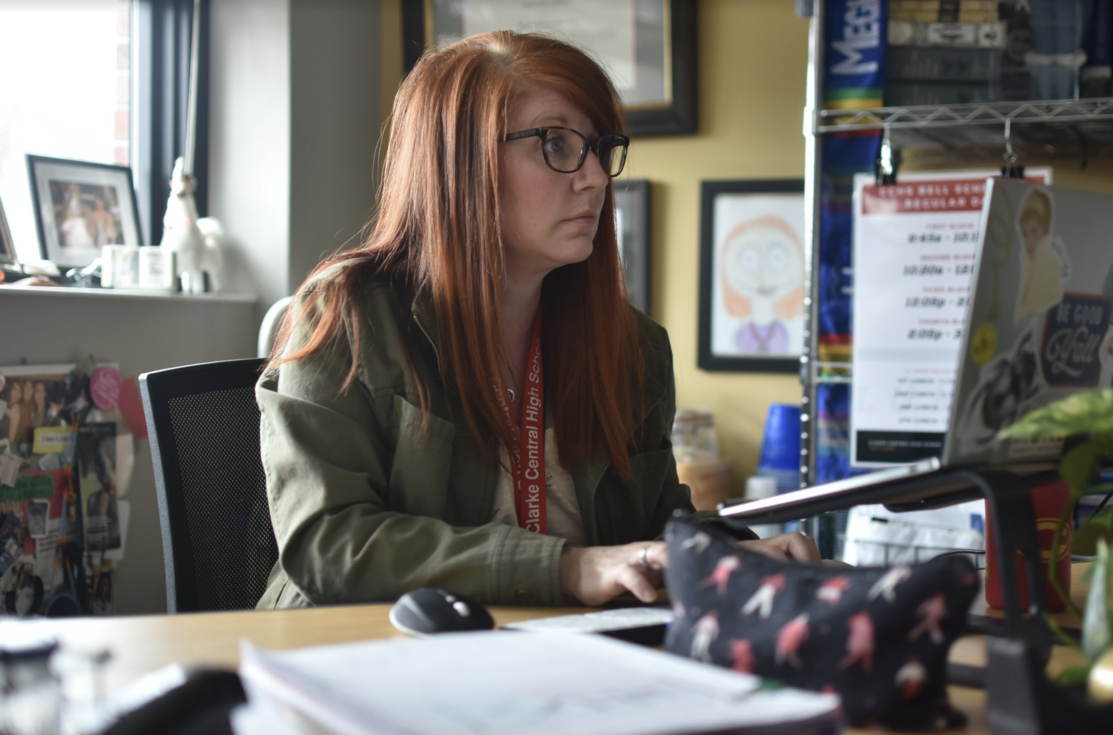Clarke Central High School Junior Kelvie Williams reenacts part of the current lockdown protocol at CCHS Feb. 15. According to CCHS English department teacher Meghan McNeeley, the existing lockdown procedures set in place for the CCHS community have shown the need for improvement in order to ensure safety for students, teachers and faculty. Photo by Lucas Donnelly
As the number of school shootings and lockdowns spike across the nation, demand for better security protocols rises at CCHS community.
There were 30 school shootings nationally in 2018, 27 in 2019 and nine in 2020, according to a Dec. 31, 2021 Washington Post article. In 2021, this number increased to 42.
“(In 2021), the nation smashed the previous record of 30, despite most schools remaining closed to in-person classes for the first two months of the year,” the article stated. “In total, about 34,000 students were exposed to gun violence in 2021, bringing the tally since the Columbine High massacre to more than 285,000.”
According to the 2014 study, “Student safety: Parents’ and school principals’ perceptions” in the academic journal “New Waves”, this shooting sparked national change in public schools toward greater campus security and emergency planning.
“Following the notorious mass murder at Columbine High School in Littleton, Colorado, in April of 1999 and a series of other school mass-shootings during the 1990s, more state governments around the country began to require school safety or ‘crisis management’ plans to address potential threats to student safety in public schools,” the study stated. “Many of these plans were drafted with active shooters as the primary anticipated threat.”
An interactive map shows all school shootings that occurred in America in 2021 and 2022, as of June 8, 2022, with red pins denoting a shooting where someone died and blue pins denoting a nonfatal shooting. Clarke Central High School English department co-chair Meghan McNeeley encourages an awareness of school security to prevent intrusions like potential school shootings. “We’re pretty vulnerable here. This is not a very secure campus and it’s hard to make it secure. I know Dr. Huff has taken measures since he has been her, but we are open on all sides to pretty busy streets,” McNeeley said. “Because things haven’t happened here we think it can’t happen here, but I just sometimes look at the openness of our campus and how students come and go from all over. You want it to be (a) free space, but at the same time, you want it to be safe, and I think that all aspects of that need to be considered.” Graphic by Anna Shaikun and Emily Couch
Clarke Central High School English department co-chair Meghan McNeeley, who has taught at CCHS since 2017 and previously worked at Clarke Middle School for 17 years, notices a freedom of movement of students and visitors around the CCHS campus.
“(It) was shocking when I first came here, but we’re pretty vulnerable here. This is not a very secure campus, and it’s hard to make it secure,” McNeeley said. “I know that measures have been taken (by CCHS Principal Dr. Swade Huff), but we are open on all sides to pretty busy streets. I think because things haven’t happened here, we think it can’t happen here. But I sometimes look at the openness of our campus, and how students come and go from all over — from (the) Career Academy and (the University of Georgia) when they’re dual-enrolled, and parents come onto the campus. You want it to be an open, free space but at the same time, you want it to be safe.”
According to CCHS Assistant Principal Dr. Summer Smith, when there is a need for administrative attention, one of two protocols is employed. An administrative hold will keep students in classrooms, while a lockdown, which is more secure with additional restrictions, is initiated in cases of more serious threats such as intruders. Before the pandemic, these protocols were referred to as soft lockdowns and hard lockdowns, respectively.
“The administrative hold means that business can continue as usual inside classrooms, but everyone has to be out of the hall. The lockdown means that students and teachers should take cover in classrooms, turn off lights (and) get away from doors or windows,” Smith said. “The administrative hold is usually used for situations where the halls need to be clear or if there is something happening in the community that is concerning, but not a serious threat. The lockdown is used in the most serious of threats.”
A juxtaposition of two pictures shows the difference between a lockdown and an administrative hold. Lockdowns were formerly known as hard lockdowns, while administrative holds were previously known as soft lockdowns. “A lockdown means that students and teachers should take cover in classrooms, turn off lights (and) get away from doors or windows. (Lockdowns are) used in the most serious threats,” CCHS Assistant Principal Dr. Summer Smith said. Graphic by Anna Shaikun
The protocols set in place at CCHS include Centegix CrisisAlert badges, which have been utilized among Clarke County School District administrators, faculty and staff since Aug. 27, 2021. Centegix is an Atlanta-based information technology company that provides emergency communication tools for various fields.
“The decision to install Centegix (in the CCSD) occurred after the school shooting in Parkland, Florida,” CCSD Safety and Energy Coordinator Patrick Dyer said. “We have decided to use the Centegix platform as a means to increase our chances of survival in an emergency scenario by equipping as many staff members as possible with the ability to notify as many people as possible, as fast as possible.”
CCHS faculty and staff were trained to use Centegix badges via an asynchronous video lesson. According to Dyer, pressing the badge three times will initiate a staff alert for CCHS administrators and security officers in cases of less serious events, such as student altercations. In some cases, administrators will then choose to initiate an administrative hold to secure the entire campus. If the button is pressed eight times or more, the alert will also reach all CCSD Cabinet members and school resource officers, and immediately send the school into lockdown.
“Some positive feedback (about the badges) is that staff members use the staff alert feature regularly for assistance with student altercations, and that they really like that function,” Dyer said.
According to CCHS Family Engagement Specialist Christian Barner, Smith and the Centegix Admin Alerts Reports, an administrative hold took place on Dec. 3, 2021 due to administrator action instead of a badge press, and a lockdown that was later decreased to an administrative hold was initiated on April 14 due to a badge press. The Centegix Admin Alert Reports also reflect an Oct. 14, 2021 lockdown, however the ODYSSEY Media Group was unable to confirm this event. On such occasions of administrative holds and lockdowns, Barner sends an email to families to clarify the event.

A screenshot shows an email from CCHS Family Engagement Specialist Christian Barner informing CCHS community members about an administrative hold that took place that day. Junior Kelvie Williams feels that it’s beneficial for students to be notified why they were on lockdown. “(CCHS administration should) send emails out to the parents about what’s going on,” Williams said. “(Although) we’re students, we should still be in the loop, because it’s our lives at stake as well. I feel like even if it’s not a hard lockdown, we should still know what’s going on around us, instead of waiting until four o’clock to get an email about what happened.” Photo by Anna Shaikun
“This afternoon, Clarke Central was placed on a brief administrative hold. A student reported that they saw another student in possession of a weapon,” Barner stated in an email to CCHS families on Dec. 3, 2021. “The school’s safety protocols were executed, and it was quickly determined that there was no weapon on campus and no threat to students or staff.”
CCHS Adaptive Curriculum department teacher William Lance utilizes the CrisisAlert phone app connected to the badge system, which allows him to see the name and location associated with a badge press in order to respond. Lance has found that the badges offer an efficient way to respond and resolve threats to student safety such as physical altercations.
“I think it makes situations more safe, because teachers can press (their badge) when an altercation (occurs), or (if ) they can tell that students are getting more aggressive but haven’t fought yet, and they can press and get people there before it even happens,” Lance said. “There’s been times where I’ve responded, and then it didn’t get to (the level of) a fight.”

CCHS English department teacher Meghan McNeeley stands in the hallways displaying the Centegix security badges CCHS faculty use for lockdown protocols on March 31. Due to the several false alarms that have been triggered by the security badges, the existing lockdown procedures are
in dire need of changes and improvements. “I think there needs to be some very clear outlines of scenarios
or situations,” McNeeley said. “We teachers need training at the beginning of the year. I think that kids need training. I think knowledge is power.” Photo by Aza Khan
While the badges have initiated the proper security response in these cases, three inadvertent lockdowns took place this school year, on Dec. 6, 2021 and Jan. 18 according to Centegix Admin Alerts Reports obtained by CCHS Principal Dr. Swade Huff, and on Jan. 24, according to CCHS Police Team Leader Officer Pecos Williams.
“If you press the (badge), it doesn’t alert you if you press it three times, and give you something that signals, ‘Hey, it’s out there, people are coming,’” Lance said. “So you start pressing, and then you don’t know how many times you’re counting because you’re a teacher witnessing a fight. So you’re just, go, go, go, go, go, and then all of a sudden you’ve pressed it too many times, and now we’re on lockdown.”
According to Smith, on Dec. 6, 2021, a badge holder intended to initiate a staff alert in response to a student altercation in the Mell Lobby. However, due to inadvertent additional presses, the school went into lockdown. According to Huff, many students were in the Miller Jordan Jr. Food Court and outdoors on the CCHS campus during the event, unsure of where to seek safety.
“When (the Dec. 6, 2021 lockdown) happened during lunch, it gave us an opportunity to reflect on practices that we have in place, because again, the goal is if it’s a serious threat, to make sure that our kids (that) were in the cafeteria have a (safe) location in the Mell Auditorium,” Huff said. “But at the same time, we have to remove the barriers because teachers don’t have a master key to access the Mell Lobby.”
CCHS freshman Braelin Grant believes the inadvertent lockdowns have led to a level of desensitization to potential danger among her peers.
“I feel like (the false lockdowns) contribute a lot to people not being as worried about a lockdown when it actually comes, because it’s always written off as, ‘Oh, it’s probably a fight or something,’” Grant said. “That seriousness is kind of taken away from it and it shouldn’t be, because if it was a shooter in school, then we wouldn’t think that it is that serious.”
Regardless of the cause for a lockdown on campus, Grant feels unsettled during these events.
“Lockdowns make me feel anxious, and I know, especially, for a lot of my friends, they get (anxious) when they don’t know what is happening,” Grant said. “Most of the time, either the students or teachers don’t know what’s happening. A lot of them only figure out what is happening through rumors, which can most of the time either be wrong or be exaggerated.”
“Lockdowns make me feel anxious, and I know, especially, for a lot of my friends, they get (anxious) when they don’t know what is happening. Most of the time, either the students or teachers don’t know what’s happening. A lot of them only figure out what is happening through rumors, which can most of the time either be wrong or be exaggerated.”
— Braelin Grant,
CCHS freshman
While she recognizes the need to withhold information to ensure its accuracy, CCHS parent Mary Attaway recommends more efficient communication to families after the school day ends to mitigate the spread of such rumors.
“I know there was a lot of different stories floating around amongst (my daughter CCHS freshman Camille Attaway) and her friends, and everybody, after the (April 14 lockdown),” Attaway said. “(Administrators) must know that the children are texting their parents, so maybe I could see that they (could) send something out earlier, just saying that something’s going on. But I’m sympathetic to the fact that they don’t want to create too much panic or alarm and have parents rushing to the school.”
According to licensed Athens psychologist Katherine Gross, it is important for students to have emotional support from adults in these situations.
“Teachers (should be) equipped with the support they need beforehand so that they can do the drill effectively, or respond effectively if there is, indeed, a lockdown, but also provide (students with) that emotional support,” Gross said. “We have to get creative with how we are supporting students and teachers in case of an emergency, because (campus safety threats are) a real issue that students are facing.”
As a student, Grant feels there has been a lack of training about what to do during each protocol.
“I don’t think I necessarily feel prepared for lockdowns,” Grant said. “I think definitely with fire alarms or tornado warnings I do, but if it’s a type of lockdown, I don’t know what the different types are, because I don’t think that’s ever been said to me.”
During her 17-year tenure at Clarke Middle School, McNeeley experienced a school intrusion, which resulted in a lockdown. As a result of the encounter, McNeeley makes a point to teach her students how to stay safe during these safety crises.
“I tell my students my CMS story, and we go over it. I always explain to them at the beginning of the year or beginning of the semester what to do, why we do it and how to handle (lockdowns),” McNeeley said. “I feel like we have to be very upfront (because) we do these security things for this reason.”
McNeeley sees a need for new ideas to be incorporated into CCHS’ security protocol, including improvements in the staff and faculty lockdown training to ensure a better understanding of what to do on campus in the event of an emergency.
“We, teachers, need training at the beginning of the year, (and) kids need training. (We need to) tell them it’s coming (and) get them ready,” McNeeley said. “If you’re a teacher who’s not comfortable doing that because you, yourself, don’t understand it, have one of us veteran teachers come in and talk to the kids (and tell them) it’s going to be okay.”
English department co-chair Meghan McNeeley sits at her desk on February 16. McNeeley, who experienced a lockdown due to a school intrusion during her time teaching at Clarke Middle School, believes students are less worried about lockdowns if they are well-informed. “I’m all about transparency, honesty, and facts. (A lockdown) is alarming, (but) I don’t think the trauma and the fear would be as great if we were to say, ‘Hey, Friday, we’re going to practice and this is why.’” Photo by Aza Khan
Along with his 20 years of military experience and education in Criminal Justice and Security Management, CCHS Senior Army Instructor Lieutenant Colonel David McMickle believes a clear and improved emergency response protocol is necessary at CCHS.
“(Lockdown protocol) is a topic that we should have professional learning on to make us more effective teachers in the event that we have an emergency. (During an emergency) is not the time to try to train people or figure out what’s going on,” McMickle said. “Everybody has to understand and go do (lockdown) training, because one leak is going to cause the enemy or the person that is trying to do the harm, to get in.”
Lance also encourages more education about lockdown protocol, specifically in regards to what certain signaling, such as red or green lights on the ceilings, indicate.
“I think the more students understand what each light means, I think it could go a lot smoother and can be a lot safer. The only way to keep people calm is for them to truly understand, ‘What’s my role, what’s my responsibility,’” Lance said.
While he acknowledges the Centegix badges are a step toward greater security, McMickle hopes to continue conversations with school leaders about revising these protocols.
“We need to listen to the teachers and the students that we need to keep safe. And then we need to critically look at it and say, ‘This isn’t working or this is working,’ and then we need to refine (and make changes),” McMickle said.
“I look forward to reading something at the end of the day from the administration, but we get so much correspondence that I do feel like if we were inundated with every accidental hold or lockdown that it would be too much.”
— Camille Attaway,
CCHS parent
As CCHS and the CCSD continue to evolve safety protocols for campuses, there remains differing opinions on desire for communication following these events. Attaway believes a notification should only be sent when the lockdowns are intentional.
“I look forward to reading something at the end of the day from the administration, but we get so much correspondence that I do feel like if we were inundated with every accidental hold or lockdown that it would be too much,” Attaway said. “So maybe an idea would be to kind of summarize it in the weekly newsletter or something if they felt the need to, but I only want to be notified when it’s an intentional lockdown for something that was going on.”
CCHS junior Kelvie Williams hopes to see an increase in communication from administrators in these events for the peace of mind of the students affected.
“If they are going to lock us down and not let us know anything, (they should) send the emails out to the parents about what’s going on,” Williams said. “I feel like even if it’s not a hard lockdown, we should still know what’s going on around us, instead of waiting until 4 o’clock to get an email about what happened. We were already worried at school all day.”
Story by Emily Couch
Story by Audrey Enghauser
Packaged by Anna Shaikun

